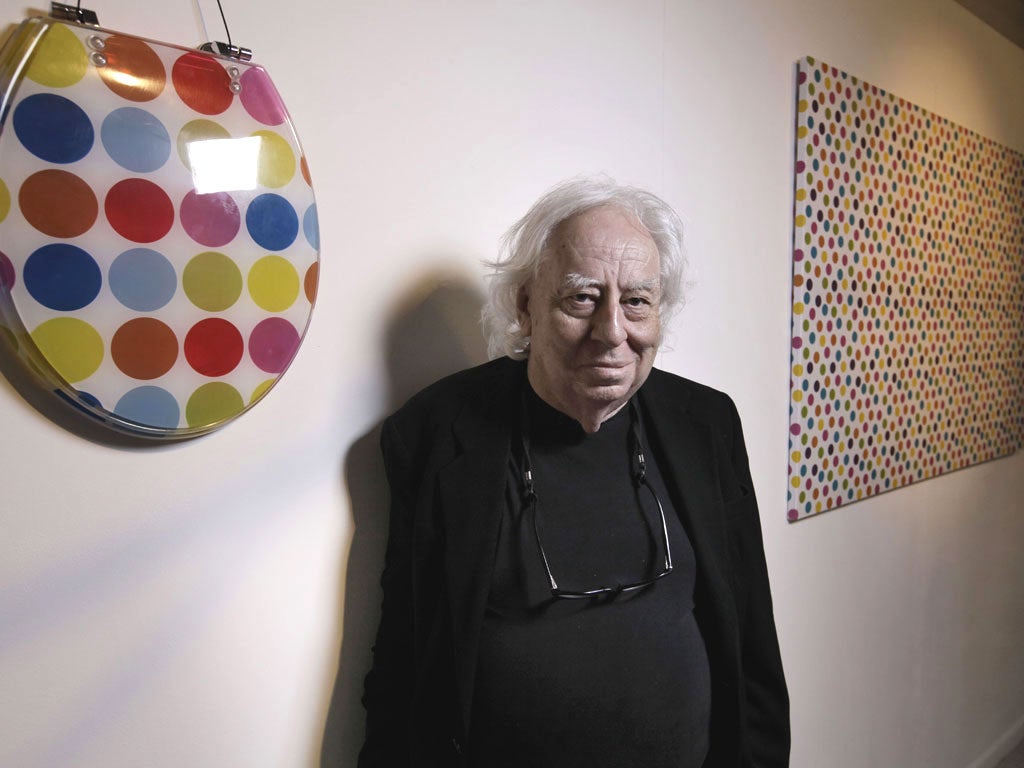Get your own Hirst for just £1.86!
An exhibition uses readymade objects to question the excesses of the contemporary art market

Your support helps us to tell the story
From reproductive rights to climate change to Big Tech, The Independent is on the ground when the story is developing. Whether it's investigating the financials of Elon Musk's pro-Trump PAC or producing our latest documentary, 'The A Word', which shines a light on the American women fighting for reproductive rights, we know how important it is to parse out the facts from the messaging.
At such a critical moment in US history, we need reporters on the ground. Your donation allows us to keep sending journalists to speak to both sides of the story.
The Independent is trusted by Americans across the entire political spectrum. And unlike many other quality news outlets, we choose not to lock Americans out of our reporting and analysis with paywalls. We believe quality journalism should be available to everyone, paid for by those who can afford it.
Your support makes all the difference.To some it was a standard porcelain urinal, to others a landmark of 20th century art, a cornerstone of the avant garde. The French artist Marcel's Duchamps' Fountain provoked an international scandal when it was rejected for exhibition on the grounds that it was not art. Nearly a century on and a distinguished British art historian and critic is challenging the public over whether art can be produced by those who have a talent for drawing or those who can simply draw breath.
Edward Lucie-Smith questions whether art-lovers who forked out £1.75m for a Damient Hirst spot painting would not have done better hanging up a £1.86 spotted table-cloth from Sainsbury's instead. He advises they also avoid laying out tens of thousands for Tracey Emin's words in neon lights, by seeking out similar objects on eBay for under £20.
The art expert plans to mock Hirst and Emin by staging an exhibition with ordinary mass-produced objects similar to their so-called "artworks" but at a fraction of the price. Other exhibits include a spotted toilet-seat bought in Tesco for under £25. While the dozen exhibits (10 "Emin-like" neon pieces and two "Hirsts") are pointedly humourous, his serious point is that – at best – these artists simply rehash Duchamp's urinal joke, at the buyers' great expense.
"In choosing these objects from ordinary commercial sources, I am directly in the tradition of Duchamp, the inventor of the readymade [object], who is now regarded as being one of the most important 20th-century artists," Lucie-Smith said. Duchamp's urinal was a prank, he said: "It was submitted to a non-juried exhibition where they were saying 'We'll take anything'… to find out what they wouldn't take."
Lucie-Smith is posing a similar question. "Art is all about perception. Once you say 'This looks like a Damien but isn't', people cease to take it seriously."
None of the mass-produced exhibits, Lucie-Smith said, are copyrighted to the designers by the manufacturers. Nor do objects "pretend to be works by the artists concerned", he added. "They can, however, be regarded as satirical comments on some aspects of their work, both in terms of banality of content and of the huge prices asked for Hirst and Emin 'originals'."
He pointed to the irony that Duchamp's urinal has a toilet-seat heir. He may put the toilet-seat in one of the toilets, rather than a gallery at the Bermondsey Project in London, where the exhibition opens this week.
Hirst, one of Britain's richest men, sells his objects for up to £10.34m. Tate Modern's recent Hirst exhibition drew 463,087 visitors, its most-visited solo show. Emin made her name with an unmade bed and has seen her work sell for up to £157,250.
Controversy surrounding their works is growing in the art world. This year, Julian Spalding, a former museum director, advised collectors of Hirst and Emin to "sell while you can", dismissing their work as "con art" – a play on the term "conceptual art", the so-called art of ideas.
Lucie-Smith argues that abolishing the need for skill and craft, our culture simply focuses on celebrity. As a result he is staging his satirical show alongside an exhibition he commissioned from the Stuckists, artists who promote traditional artistry and whose numbers are growing – in 52 countries, since their founding in 1999. "I think it is time at least some Stuckist artists came in from the cold," he said, referring to their being looked down on by conceptual art's élite establishment.
The White Cube Gallery, which represents both Hirst and Emin, declined to comment.
Join our commenting forum
Join thought-provoking conversations, follow other Independent readers and see their replies
Comments